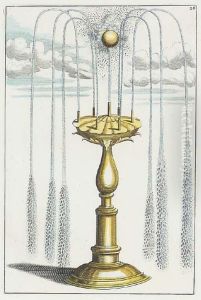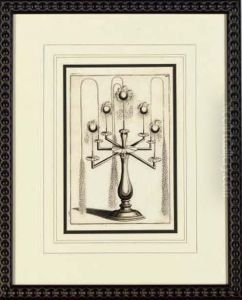Georg Andrea Bockler Paintings
Georg Andreas Böckler was a German architect, engineer, and author, born in Cronheim (now part of Gunzenhausen, Bavaria) in 1617. His life spanned the tumultuous Thirty Years' War and the subsequent period of reconstruction in Europe, during which he made significant contributions to the fields of architecture, hydraulics, and mechanical engineering. Böckler's work is primarily remembered for its emphasis on the practical application of technical knowledge, particularly in the areas of water management and architectural design.
Böckler's most renowned publication is 'Architectura Curiosa Nova' (1664), which illustrates a wide variety of waterworks, including fountains, garden designs, and hydraulic machines. The book is notable for its detailed engravings, which provide insights into the technological and aesthetic considerations of the time. Böckler's interest in hydraulic engineering is further evidenced by his other works, such as 'Theatrum Machinarum Novum' (1661), where he explores the use of machines in construction and water management. These publications reflect Böckler's fascination with the power of water and its potential to enhance the beauty and functionality of architectural spaces.
Beyond his technical contributions, Böckler also played a role in the dissemination of architectural and engineering knowledge across Europe. His books were widely read and influenced the development of baroque garden design and the use of water features in architectural projects. Despite the focus on practical applications, Böckler's work also reveals an underlying commitment to the aesthetic dimensions of engineering and architecture, blending functionality with beauty.
Georg Andreas Böckler passed away in 1687, leaving behind a legacy of innovation in architectural and hydraulic engineering. His work represents an important bridge between the Renaissance emphasis on the revival of classical knowledge and the Baroque era's exploration of dynamic forms and spaces. Through his publications, Böckler contributed to the spread of technical knowledge and the evolution of architectural and engineering practices in early modern Europe.


![[fountain Designs]](https://www.niceartgallery.com/imgs/420308/s/georg-andrea-bockler-fountain-designs-4eaa3d97.jpg)